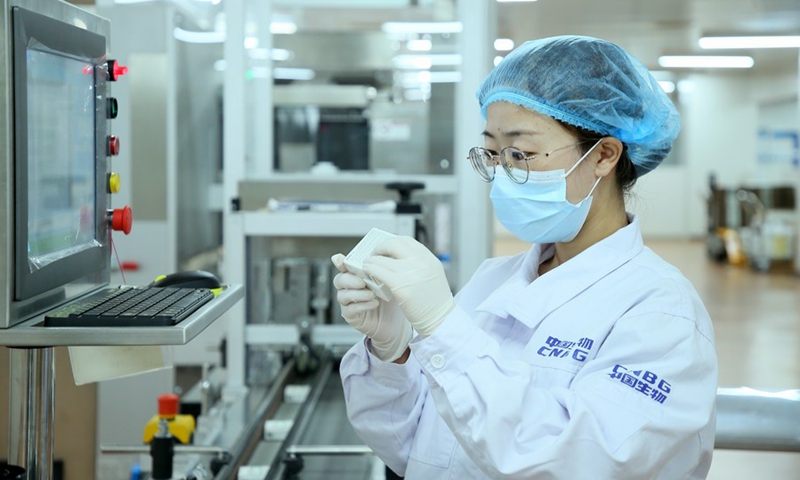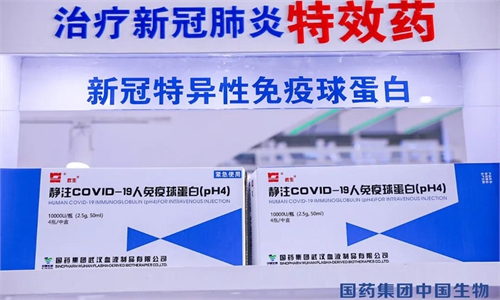Sinopharm to launch COVID-19 drug clinical trials in UAE
Vaccination still most effective measure against pandemic: chief scientist

A staff member checks the packaging of the Sinopharm vaccines in Beijing, capital of China, May 31, 2021.(Photo: Xinhua)
A top scientist at China's healthcare giant Sinopharm said the group's COVID-19 drug would soon be put into a clinical trial in the United Arab Emirates (UAE) and, while numerous COVID-19 drugs have reportedly been authorized for emergency use around the world, vaccination is still the most effective way to tackle the pandemic in terms of building herd immunity.
Zhang Yuntao, vice president and chief scientist of Sinopharm's subsidiary China National Biotec Group (CNBG), made the remarks in an interview with the Global Times on Tuesday.
CNBG previously revealed that it was working on the development of two COVID-19 medicines based on human immunoglobulin and monoclonal antibodies.
The human immunoglobulin drug, an intravenous injection, has obtained authorization for clinical trials in China and the UAE, and the trials would launch in the coming days, Zhang said, noting that it is the world's first special immunoglobulin product that has obtained official approval for clinical trials.
The drug has already been used in recent flare-ups across China and it has proved to have a good therapeutic effect. The other medicine, based on monoclonal antibodies, has showed good neutralizing effects on the novel coronavirus in current experiments and is undergoing the procedure to obtain clinical trial approval from the Chinese authorities, Zhang said.
Besides CNBG, many other Chinese firms are making steady progress on the research and development (R&D) of COVID-19 treatments.
For example, Brii Biosciences, a company that has dual headquarters in China and the US, has applied to the US Food and Drug Administration for emergency use authorization for a SARS-CoV-2 neutralizing monoclonal antibody combination therapy called BRII-196/BRII-198, which can reduce the rate of hospitalization and death by 78 percent among high-risk COVID-19 patients.
The medicines of CNBG and Brii Biosciences are bio-macromolecular drugs that cure patients by neutralizing the virus and preventing it from replicating in the human body. They are of good specificity, efficacy and safety, Zhang said.
Meanwhile, the two drugs from Merck and Pfizer that were revealed as the latest improvements last week are small molecule drugs. These drugs have various working mechanisms to inhibit the virus' absorption, replication, assembly and release, he explained.
The UK on November 4 became the first country in the world to approve a potential COVID-19 antiviral pill jointly developed by US-based Merck and Ridgeback Biotherapeutics.
According to the UK government website, clinical trials demonstrated that the drug, which is called molnupiravir, will be sold under the name Lagevrio. It was effective in reducing the risk of hospitalization or death for at-risk non-hospitalized adults with mild to moderate COVID-19 by 50 percent.
Applications also remain under review by other regulatory authorities, including the US Food and Drug Administration and the European Medicines Agency, an employee of Merck told the Global Times on Tuesday at the China International Import Expo in Shanghai.
One day later, another US biopharmaceutical company - Pfizer - said its experimental antiviral pill to treat COVID-19 cut by 89 percent the chance of hospitalization or death for adults at risk of severe disease.
Merck's and Pfizer's announcements boosted global confidence and expectations about fighting the COVID-19 pandemic. But experts warned that drugs are not intended to be a substitute for vaccination, which is still the most effective measure to prevent the expansion of epidemic diseases as it builds herd immunity rather than just curing individual patients.
Drugs can reduce the incidence rate of severe cases and deaths, but cannot terminate the pandemic, Zhang said, noting that the usage of both vaccines and drugs can help to control the impact of the pandemic to the smallest scale.
According to Zhang, CNBG's COVID-19 vaccines have been used in 112 countries and regions, making CNBG the company whose vaccines are used in the most places in the world.
The Chinese National Health Commission said Tuesday that nearly 2.34 billion COVID-19 vaccine shots had been administered in the country as of Monday.
Zhong said that the criterion for China to generally relax border controls would arrive when 80 to 85 percent of people had been vaccinated.

